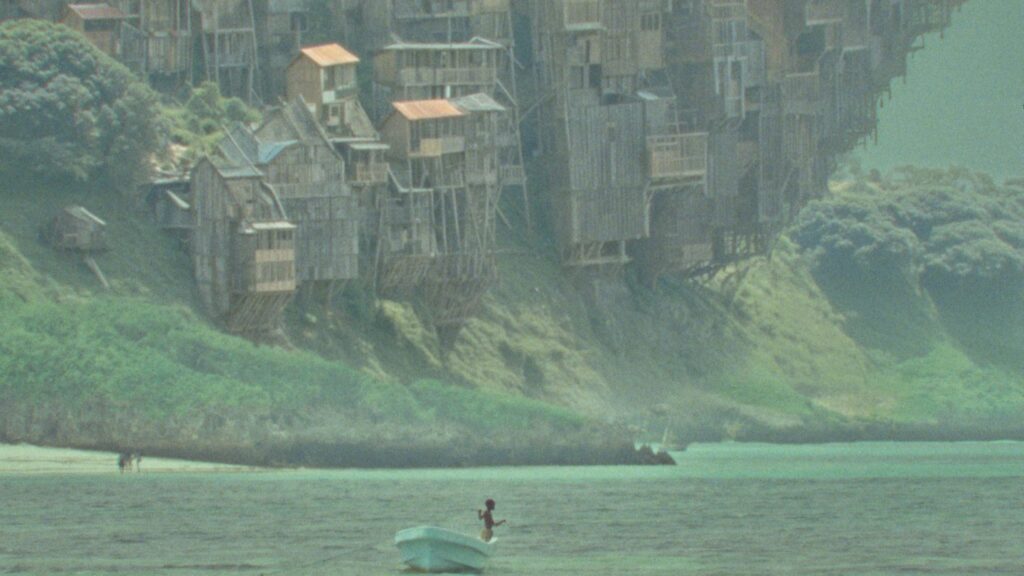Swiss-Kenyan filmmaker Damien Hauser‘s (After the Long Rains, Blind Love) new feature, Memory of Princess Mumbi, world premiered in the Giornate Degli Autori, or Venice Days, program, the independent parallel section of the Venice Film Festival. The sci-fi romance mockumentary, which is set in a futuristic Africa and explores such themes as memory, finding happiness in a tragic world and the importance of small moments, next screens at the Toronto International Film Festival, starting on Friday.
“In 2094, aspiring director Kuve (Abraham Joseph) films a documentary on the Great War of the 2070s, which erased modern technology and revived kingdoms,” says a synopsis in the movie. “Expecting to find despair in Umata, the heart of the war’s aftermath, he instead discovers a village that has found peace. There, he meets Mumbi (Shandra Apondi), who shows him the beauty in everyday moments.” Samson Waithaka plays a prince who promised to marry Mumbi, creating a love triangle.
Hauser’s use of AI in Mumbi also allowed him to explore what AI means for the future of filmmaking in the process.
THR talked to the director about his use of AI and his views on the technology’s future role in film.
How did you start including AI in Memory of Princess Mumbi?
I was generating a lot of AI images just for fun and to see what is possible. At the beginning, it was very random, but I tried to connect those themes, including why use AI and why it is a part of the whole story. And for me, the reason lies in what I try to do with this film. I tried to make a film which AI couldn’t do, because AI is always based on films that we already made and know.
Since you used AI for the film, I wanted to ask you about your take on the debate about it. Some people are worried that AI is a danger to creativity and creatives, others see it as a useful tool. What do you think?
Right now, to me, it is very much a tool. I have been making films since I was 7. When I was younger, I had more knowledge about VFX, but I didn’t have the tools. But right now, that becomes easier and easier. I was able to make this film where I did the whole VFX myself, and it was very much a tool.
I am scared when it comes to – I hope it doesn’t replace the whole thing. I don’t believe it will replace artists. It will [affect] some jobs, but at the same time, even if AI creates the “perfect movie,” once we see the perfect movie, we yearn for something else. Therefore, I don’t think we are replaceable because we get bored by what we see at some point, and we search for something new, and AI can’t give us something new.

Damien Hauser
Courtesy of Venice Days
How long did the editing and effects work take you on Mumbi?
I started editing it in February last year, and I finished editing and the whole post just weeks ago. Of course, I didn’t work constantly. There was a time, for two months, where I had like a list where I told myself that each day I’ll do 10 VFX shots. And so I was just hustling throughout the whole day. Those were the most intense two months, because I just wanted to finish this thing.
But one reason that post-production took so long was the way I shot the film. I shot it like a documentary. I had over 44 hours of footage which were different types of scenes and conversations. So it wasn’t repetition. There was no repetition there. So, I could have done a completely different film. And it gave me a lot of freedom in editing. But as a result, I feel I really wrote the film in editing. And the reason post took so long was because I constantly worked on the story and reshaped it to keep cutting it down and making sure it was not boring.
Did you ever have Afrofuturism in mind when making Mumbi? Or even big-budget films along the lines of Black Panther?
No, I didn’t. I didn’t think of it like that when I shot it. I don’t even know what kind of future the film is. I guess it is just an African sci-fi film. It is very much an experiment. Sci-fi films are usually, when you think of those big films, made for the audience, because you are investing a lot of money, and therefore you have to kind of play it safe as well. You can’t experiment that much. And before I made this film, I was asking myself, “How much should I experiment with the film?” I knew, if I could use AI as a tool, I would have complete freedom to make a film that is very niche or which is very specific. I thought that’s maybe what makes the film unique.
In the future, as access to AI becomes easier, you can explore a sci-fi world so much more in different ways, which don’t have to attract everybody. I think the future of cinema over the next 10 years or 20 years can actually be very positive. It looks positive to me because everybody will be able to tell stories. When you think of Black Panther and stuff like that, those are films that take place in Africa, but were produced outside of Africa.
Africa itself, or filmmakers in Africa, never had the budget to make such a film, but I’m really looking forward to the films coming out of the continent in the future. Once people are able to tell their own stories, there will be so many crazy stories, new stories, new perspectives.

